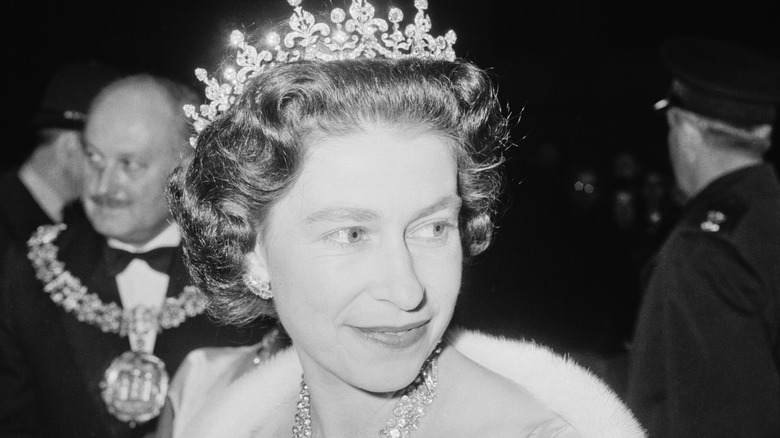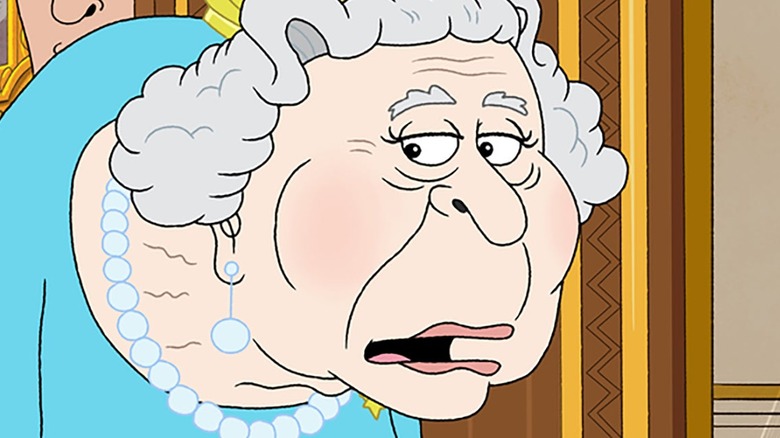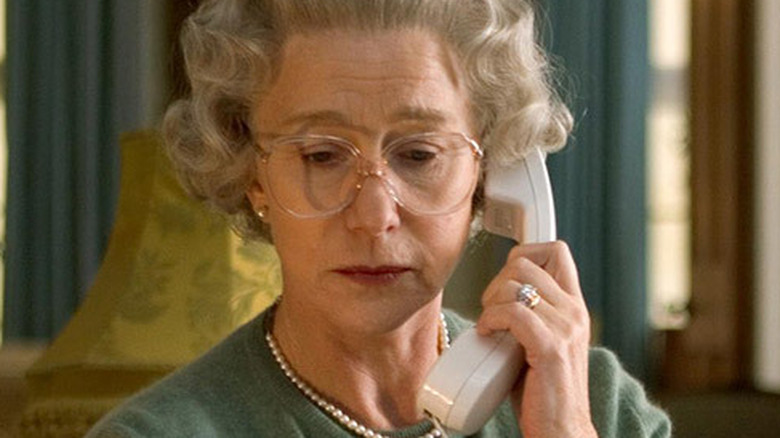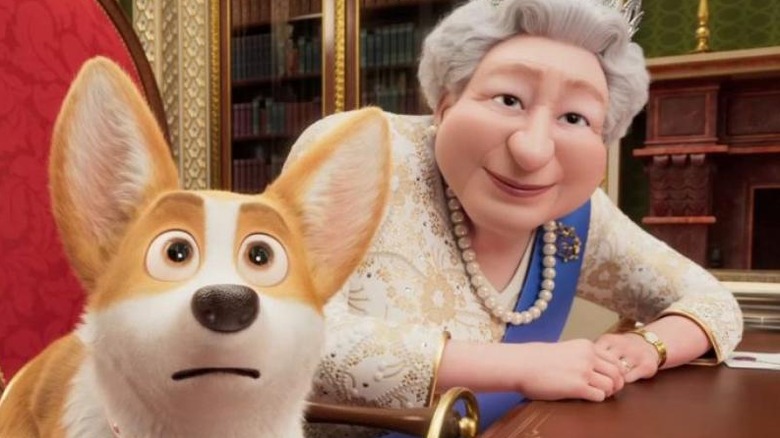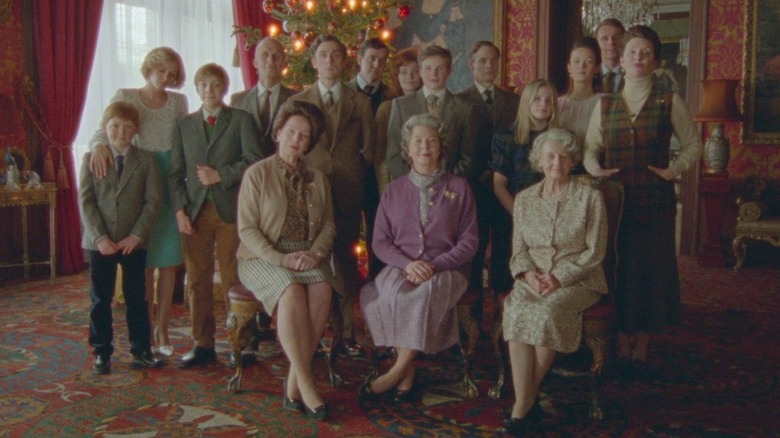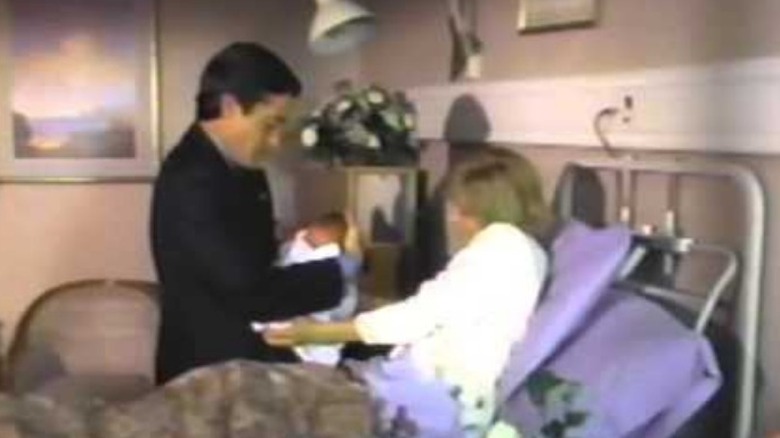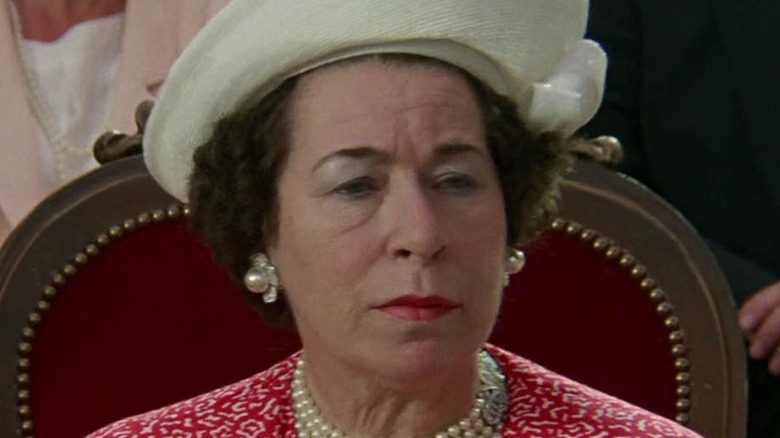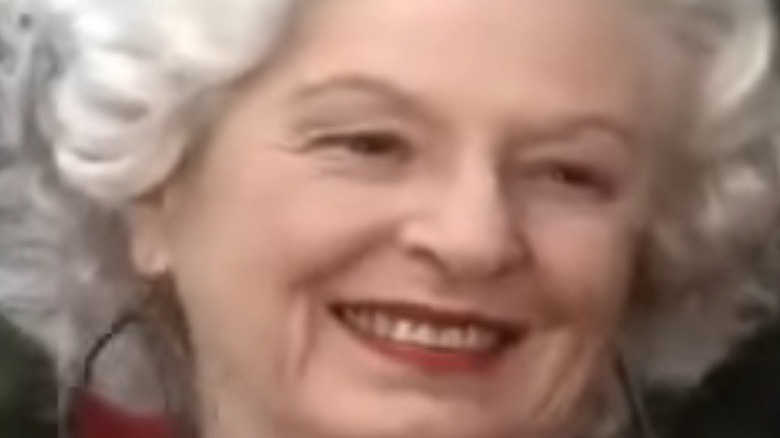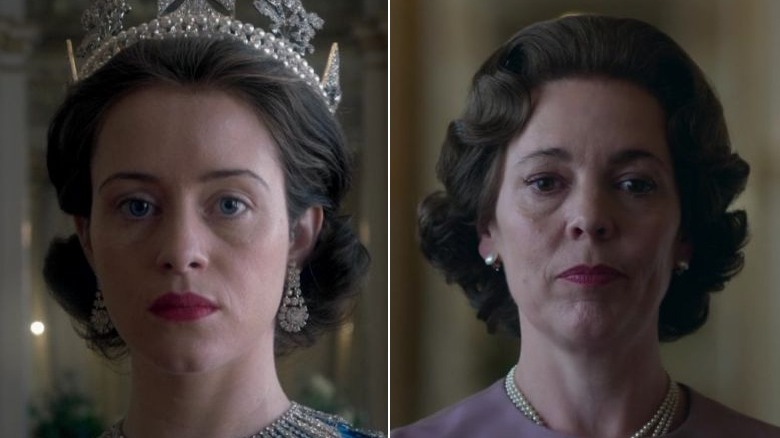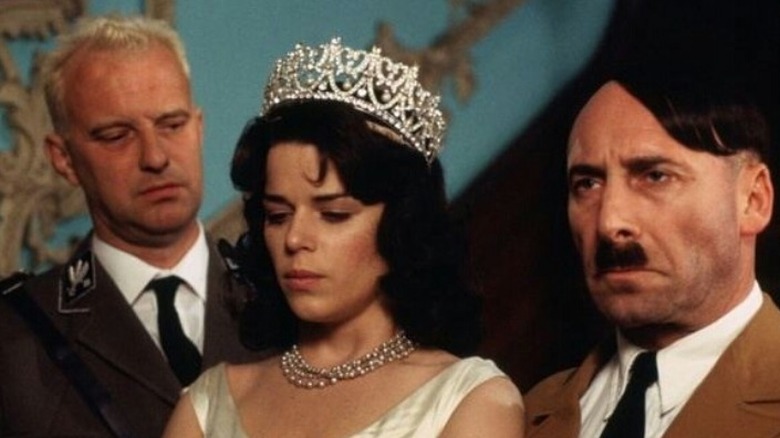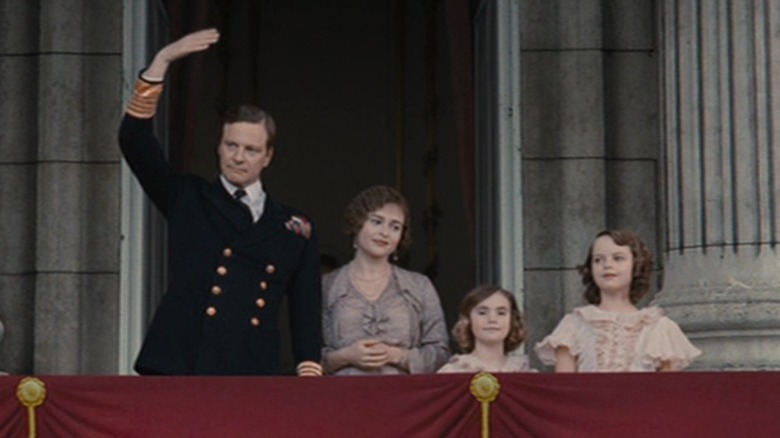The Best And Worst Portrayals Of Queen Elizabeth II On Screen
Throughout her long life and reign, one of the most remarked upon traits of Queen Elizabeth II was her reserve. The phrase "never complain, never explain" is said to have originated with Victorian prime minister Benjamin Disraeli, according to the Independent, and later adopted by the queen mother, but the queen exemplified it. Very little of her personal thoughts or feelings was ever made public, and while Politico reported that she was canny and well-informed on political matters, she remained an impartial and neutral head of state.
Elizabeth's tight-lipped performance as monarch never stopped writers, cartoonists, comedians, and filmmakers from imagining what might go on behind closed doors at Balmoral and Buckingham Palace. The opaqueness of her public image may have even encouraged dramatists and satirists; there was so little on record about her that could contradict whatever they came up with. Not every portrayal of the queen in fiction was glowing; NPR noted that depictions of her in her own right or as a counterpart to Princess Diana were more critical than deferential.
Not every fictitious take on the queen was all that good either, at least according to critical consensus. That same body found other films and TV shows to be stellar portraits. Here are some of the best and worst portrayals of Queen Elizabeth II on the big and small screen, as described by the critics.
Worst: Frances de la Tour (The Prince)
Even the most devoted monarchist should be able to concede that royalty has elements that are easily spoofed. Cartoonists have poked and mocked the royals for centuries, like an 1898 French political cartoon by Henri Meyer poking fun at Queen Victoria cutting up a cake that represents China (via Cornell University Library) can attest.
More recently, Elizabeth II and her family have been fodder for animation. Various episodes of "Family Guy," for example, use the Windsors in cutaways, and once as a central figure in a short storyline.
A veteran producer of "Family Guy" has found the royal family a perpetual source for comedy. Gary Janetti filled his personal Instagram with photo captions in the imagined voice of a sassy Prince George for years (via the Evening Standard). Janetti's imagined George frequently went after his aunt, Meghan Markle, though he eventually backed off Markle as press attention on her became more hostile. At some point, Janetti and HBO got together to expand this concept into an animated series.
"The Prince" premiered on HBO Max in 2021. Even before its release, the show faced hostile attitudes in the British press (per The Washington Post). Its focus on children in adult situations attracted the lion's share of complaints, but painting the rest of the royals in a bad light — the queen (Frances de la Tour) runs her family like a violent mafia chief — didn't help. "The Prince" had its defenders before debuting, but reviews were decidedly cool — such as Decider, which argues that the show's jokes fall flat, and it's trying to hard to be "Family Guy." Not surprising it was canceled after just one season.
Best: Dame Helen Mirren (The Queen)
Monarchy has been kind to Dame Helen Mirren. Besides receiving a damehood from Elizabeth II in 2003 (per the BBC), she's also won critical acclaim for her portrayals of royalty over the years. As of 2022, she is the only actress to play both Queens Elizabeth on film, according to Deutsche Welle. Her turn as Elizabeth I came in a two-part television special of the same name in 2005, but it's her turn as Elizabeth II in "The Queen" from the following year that's best-known to audiences.
"The Queen" was directed by Stephen Frears and written by Peter Morgan, whose many depictions of Elizabeth led The Telegraph to dub him her "unappointed portraitist-in-chief." Morgan's work frequently looks at the tensions between the duties of the crown and what the queen's private feelings (real or imagined) might have been. In the case of "The Queen," Mirren's Elizabeth is inclined to look after her grandchildren and process complicated feelings for Princess Diana privately after her death, while the British public demand a show of mourning.
NPR called "The Queen" a "tragi-comedy of manners" and devoted most of its review to praising Mirren's turn in the title role. Roger Ebert called her the key to the whole movie. Mirren's performance brought her an Oscar and an invitation to Buckingham Palace, though filming schedules forced her to decline (per the BBC). She would play the queen again in Morgan's "The Audience" on stage, as per The Telegraph.
Worst: Julie Walters (The Queen's Corgi)
As might be expected from the title, "The Queen's Corgi" does not feature Elizabeth II as its main character. That "honor" goes to Rex, the Top Dog among the queen's pets in the story. But the queen is present in the film. "The Queen's Corgi" was produced by the Belgian studio nWave, according to Variety, founded by director Ben Stassen. Julie Walters played the queen (via The Independent), although Mari Devon voiced the part when it was released in the United States in 2020 (per IMDb).
Lionsgate picked up distribution rights to "The Queen's Corgi," which premiered in 2019 in the U.K. The film was marketed as family-friendly fare, but it included overt references to "Fight Club" and Donald Trump's Access Hollywood scandal, and it featured a sexualized female corgi among its animal cast. The juxtaposition did not win many fans. The Independent went as far as to call the film "deeply unpleasant, and in no way suitable for children." The same review also took issue with perceived classist attitudes and the many jokes lifted from other, more beloved animated films. The latter complaint was echoed in the Guardian, though they gave the cast — the U.K. cast, mind you — credit for providing some genuine levity.
Best: Stella Gonet (Spencer)
Only a handful of films and television programs featuring Elizabeth II as a character put her in the center of the story. Quite often, she acts as a supporting figure or even a brief, showy cameo. Many of these cameos show her in a positive or humorous light. But others are less sympathetic to the queen and the monarchy. Certainly that's true of some of the depictions of the life and death of Princess Diana.
In "Spencer," a tight drama revolving around Diana's Christmas at Sandringham in 1991, the Windsors are painted as controlling and oppressive. ABC News' review praised Kristen Stewart for her performance as Diana, reaching for any act of rebellion and freedom against a family that act almost as her jailers. It's worth noting that at least some who knew Diana personally disputed that portrayal, including her personal chef Darren McGRady (via his YouTube channel) — but that didn't keep the critical acclaim from rolling in.
As the queen, Stella Gonet puts in only a few minutes on screen in "Spencer." Yet Collider described her performance as ever present, the pervasive embodiment of monarchy and all the constraints it places on Diana. The same analysis posits that the queen is the villain of the story even more than Prince Charles, but not one motivated by malevolence. She and her family are just too detached from Diana to understand her, or offer any helpful counsel for how to navigate their world.
Worst: Amanda Walker (Charles and Diana: Unhappily Ever After)
The relationship between Charles and Diana inspired quite a few movies and TV specials. ABC and CBS had competing prime-time dramas on their wedding in 1982. The Washington Post favored ABC's effort, though neither got unqualified praise, and the review concluded by saying "neither film is as impressive or affecting as TV news coverage of the wedding was last July." A few years later, ABC would capitalize on the collapse of the couple's marriage with "Charles and Diana: Unhappily Ever After."
None of these movies knew what the future held for Charles and Diana, and none of them were lavished on with time and money. They were quick TV shoots timed to capture viewers while public interest in the royal couple was particularly heightened. For "Unhappily Ever After," ABC poached CBS's Diana in Catherine Oxenberg, who took the part much more seriously this time around, according to UPI. Amanda Walker was cast as Elizabeth II.
Walker's performance as an authoritative yet understanding and supportive queen won some praise in the Los Angeles Times, but the film as a whole was given only lukewarm praise. Times critic Ray Loynd said it was appropriate for "palace mavens and denizens of tabloid journalism." And given that the film was made well before Diana's tragic death, it can only age so well.
Best: Jeannette Charles (The Naked Gun: From the Files of Police Squad!)
Jeannette Charles made a career out of impersonating Elizabeth II, as she herself said in the pages of The Guardian. She'd always wanted to be an actress, but it wasn't until a birthday portrait for her husband was mistaken for the queen that opportunity came knocking at her door. For decades, she made a living playing her sovereign, most often in comedies and commercials.
One of Charles' most famous outings in royal guise was for "The Naked Gun: From the Files of Police Squad!," more often known simply as "The Naked Gun." The queen has limited screen time but a pivotal role in the plot; it's her security that is Lt. Frank Drebin's (Leslie Nielsen) prime concern. His attempts to prevent an assassination attempt on the queen resulted in PR nightmares (via YouTube) and culminated in a disaster of a baseball game between the Seattle Mariners and the California Angels.
In 2021, Empire named "The Naked Gun" the seventh funniest comedy ever made. After the queen's death, the Los Angeles Times looked back on the baseball scene as a way of marking her passing. The comedy antics these sorts of films called for might be taken as disrespectful, but Charles — who retired from impersonation as of 2014 due to arthritis — insists that she's a "staunch royalist" who turned down anything she considered unbecoming of the queen (via The Guardian).
Worst: Jane Alexander (William & Catherine: A Royal Romance)
The Daily Beast might have been a little harsh when they declared "Hallmark must be stopped at all costs," but the greeting card channel's TV movies have never been hailed as groundbreaking cinema. Their feel-good and formulaic productions are often famously (or infamously) set around Christmastime, which is why they were a target of the Beast's Kevin Fallon in the first place. But in 2011, they took their inspiration from an April wedding that same year.
"William & Catherine: A Royal Romance" was directed and co-written by Linda Yellen, who had helped write "The Royal Romance of Charles and Diana" for CBS (per Variety). In promoting the film, actor Dan Amboyer, who played Prince William, insisted to the Associated Press (via the Tampa Tribune) that it would address the reality of the challenges faced by such a public couple. Those intentions were not appreciated by critics. Variety felt that the film "eradicat[ed] any personality" William and Kate Middleton might have, while the critic for the Chicago Tribune declared, "Romantics will swoon; I yawned, a lot."
Both reviews gave some limited praise to Jane Alexander as Elizabeth II, specifically for a scene where she and Kate play Wii. Alexander's queen proves rather competitive and can't quite manage to pronounce Kanye West's name. But one amusing bit of royal gaming couldn't salvage "William & Catherine's" reputation.
Best: Claire Foy, Olivia Colman, Imelda Staunton (The Crown)
As popular as "The Crown" has become, its portrayal of Elizabeth II and the royal family hasn't been universally acclaimed. The show has taken considerable liberties with historical events and filled in the many gaps in public knowledge about the queen's thoughts and feelings in a way that some have found unkind, even subversive. Simon Jenkins of The Guardian called it "fake history ... as corrosive as fake news." The Telegraph objected to the depiction of Margaret Thatcher. And royal historian Hugo Vickers, who regularly fact checks the series, has accused it of stealthily promoting republicanism in the U.K. (via Reuters). However, per Deadline, creator Peter Morgan called his show a "love letter" to Elizabeth.
With all that said, "The Crown" is still a well-loved show, and the three actresses who have played Elizabeth on it have all come in for praise. After the queen's death, The Washington Post recommended several episodes starring Claire Foy as the young Elizabeth and Olivia Colman as the middle-aged queen. Both Foy and Coleman paid individual tributes to the monarch in interviews after her death, and both received Emmy awards for their portrayals, in 2018 and 2021, respectively. From Season 5 on, the role of Elizabeth is taken over by Imelda Staunton. As CBR notes, Staunton has expressed her commitment to portray the queen in equal fashion as that of her predecessors.
Worst: Neve Campbell (Churchill: The Hollywood Years)
Hollywood has made a mess of history at times; there's no getting around it. The deviations from known fact for the sake of drama, action, or romance can get to be ridiculous. Why not exaggerate the worst of these tendencies for a comedy? That seemed to be the thinking behind the British spoof "Churchill: The Hollywood Years."
Per the BBC, the specific target of "The Hollywood Years" was older American war dramas that rewrote history to give U.S. forces credit for British accomplishments. To that end, the film casts Christian Slater as Winston Churchill, on the logic that the studio found the real prime minister "too fat, too old and too English." Slater's Churchill is also a marine, engaging the Nazis in direct combat and courting a young Princess Elizabeth (Neve Campbell) while he's at it.
The BBC essentially called Campbell a team player and up for her portrayal of Elizabeth but concluded that in trying to spoof bad movies, "The Hollywood Years" only managed to be a bad movie itself. Its review reserved any real praise for Harry Enfield's King George VI and argued that there was only enough material in the concept to sustain a late-night comedy sketch on TV. The Guardian gave the film a bit more credit but passed over any mention of Campbell's performance beyond listing her name.
Best: Freya Wilson (The King's Speech)
If the title didn't give it away, "The King's Speech" is about a king, not Elizabeth II. Specifically, it's about her father, King George VI, and his efforts to overcome his speech impediment as he ascends the throne and faces the coming war with Nazi Germany. The film was a critical and commercial smash in 2010, picking up over $400 million worldwide, according to Box Office Mojo and won four Oscars at the 83rd Academy Awards, including for Best Picture and Best Actor in Colin Firth's depiction of George.
Among those singing the praises of "The King's Speech" was none other than Queen Elizabeth herself. She was in the film, played by Freya Wilson as a young princess. Her performance, though brief, was strong enough to get a place on Collider's list of best portrayals of the queen. Wilson seemed to enjoy herself in the part, though in an interview with Nosy Crow, one of her strongest memories was how good the food was on-set.
The real queen's reported enthusiasm for "The King's Speech" came more from its depiction of her father than herself. The BBC reported that she was moved by the film at a private screening. This was 30 years after the queen mother asked screenwriter David Seidler to hold off on making the film, because the memory of the war years was still too raw. Seidler considered Elizabeth II's approval the highest of praises he could receive.
